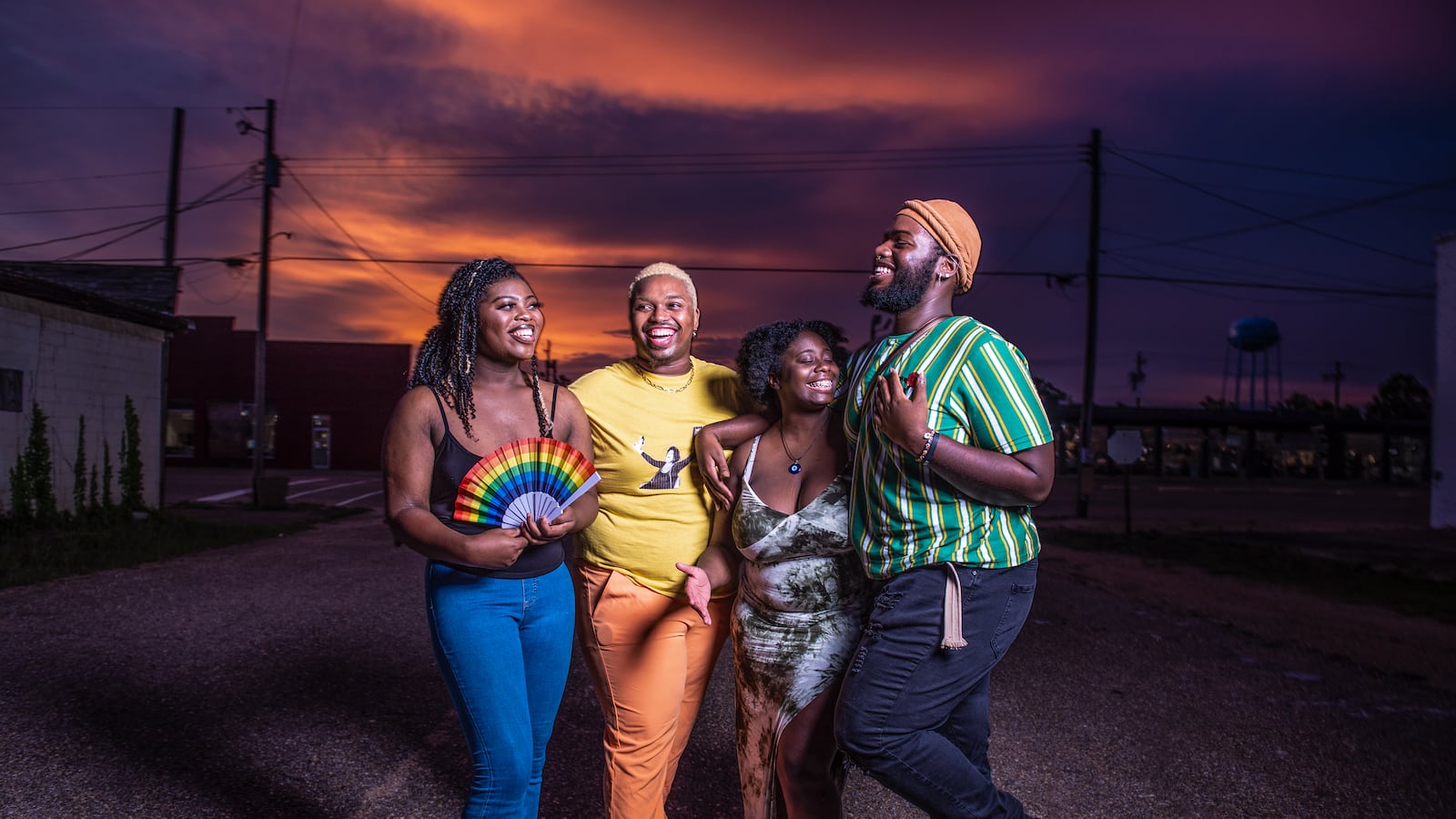As the youth group members trickle onto the video call, Joshua Baker tries to keep things light.
“Thank you for momentarily gracing us with your beauty,” he tells DaQuon, who turns off their camera as soon as they join. After Aadhya announces that she got a new car, Baker exclaims, “Come on, wheels!”
But when Peyton says they’re feeling exhausted, Baker can’t help but acknowledge: In many parts of America, it is not an easy time to be young, Black, and queer.
“Within the context of everything that’s going on in the world,” Baker says on this sweltering July afternoon, “everything just feels kind of heavy.”
Baker oversees the Youth Ambassadors, part of a nonprofit that serves and is led by Black queer people in Alabama. At 25, he is not much older than the teens in his group, yet he calls them his babies. Nurturing comes naturally to Baker, who cared for his ailing mother while in high school and then earned a master’s degree in social work. And nurturing, he believes, is what these young people need now.
In statehouses across the country, conservative lawmakers have proposed hundreds of bills this year targeting LGBTQ people and transgender teens in particular. This spring, Baker and the young people in his program watched with fear and fury as Alabama’s legislature passed one of the most restrictive measures, making it a felony for doctors to provide gender-affirming medication to anyone under 19.
Advocates temporarily halted that law through a court challenge, but others went into effect. When the new school year begins next month, transgender students will be forbidden from using bathrooms that don’t match the sex they were assigned at birth. Counselors will have to notify parents if a child expresses uncertainty about their gender identity. And teachers will be barred from discussing gender or sexuality with students until they reach sixth grade.
This afternoon, as the Black queer youth group gathers for its twice-monthly Zoom meeting, Baker knows he can’t singlehandedly reverse the new rules. But he can provide these young people a refuge where they feel safe enough to remove their armor and stretch out into their full selves, together.
It’s “a place of warmth, a place of joy, a place of comfort,” he reflects later, one “that says we are so much more than our trauma. We are so much more than our grief.”
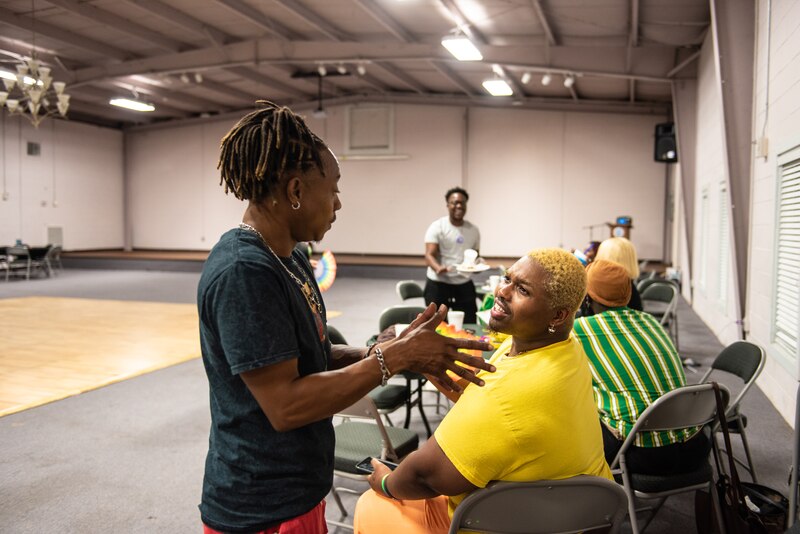
Facing the fire
For all his talk of joy, Baker decides to start the day’s meeting by discussing pain.
He knows that telling students simply to “choose joy” could ring hollow when some have faced bullying at school and disapproval at home, and now they are watching lawmakers limit their autonomy and protections. So first: Acknowledge the hurt.
To that end, Baker plays a video of one of his favorite poets, Alysia Harris, performing a piece called “Controlled Burn.” In it, the narrator compares her pain to being set on fire. Towards the end she prays, “May this pain make me patient.”
“The goal of that is not to minimize the pain we’ve been through, it’s not to minimize the trauma,” Baker says. “But it’s to see what can grow from it.”
Baker grew up in Huntsville, Alabama, where his mother was a Baptist minister and he sang in his church’s youth choir. He knew early on he was gay, and he sensed he should keep it secret. At church homosexuality was a sin, and at school it was a slur. In high school, watching the few openly queer students endure abuse, he learned that safety can require secrecy.
“High school was an attempt to perform straightness for survival,” he recalled.
In college, he lost his mother, who had struggled with diabetes and kidney disease. He had long worried that publicly disclosing his sexuality would bring shame on her. But two years after her death, when he was 22, he decided to share his full self with the world.
The decision opened new doors. He began conducting doctoral research on Black queer experiences and, this January, was hired to run the youth program.
The program is one component of The Knights & Orchids Society, or TKO. The nonprofit was founded a decade ago by Quentin Bell, a Selma native who is transgender, and his wife Jennine to serve other Black trans and queer people in Alabama. Today the group provides free services ranging from gender-affirming medical care to food and housing assistance, in line with its leaders’ mantra: “We are the help we need.”
At times the Youth Ambassador meetings call to mind a college seminar; at other times, a lively get-together. But now, as Baker speaks to the young people on his computer screen, it feels more like group therapy. You are more than your circumstances, he tells them. You are more than your pain.
“We, in and of ourselves, deserve better,” he says, “even if that’s not what we’re receiving.”
At that, one of the young people chimes in. “Amen, y’all.”
Under attack
If Baker could end it there, he would. These young people deserve peace and happiness, period.
But he knows their peace is always precarious. Racism, homophobia, transphobia loom over their lives, requiring constant vigilance.
“There is not a day that some part of that oppression does not pop up,” Baker says to the group. “I have to be careful with how I dress, how high my voice is or how deep my voice is, how I present myself, how I engage.”
This resonates with Peyton, who will soon begin 12th grade.
“Us being Black and queer, it just adds a whole other level of oppression,” they say during the meeting. “Like people don’t think we should exist. People hate us. They don’t want us here, you know?”
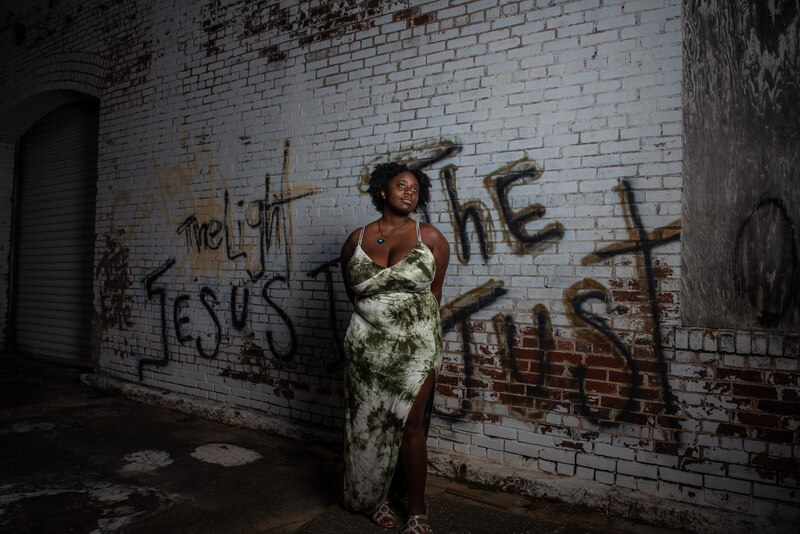
Peyton, who uses they and she pronouns, has seen this prejudice up close. In their Montgomery middle school, students could be cruel and casually homophobic. When queer people made the news, the circumstances were often tragic. In Peyton’s eighth grade year, Nigel Shelby became national news: A gay teen from Huntsville who was bullied in school, he died by suicide.
“Gay people dying, trans people dying or getting hate crimed,” Peyton recalled. “That’s tough to see.”
Peyton also had been bullied. “I would cry a lot in school,” they said. “A lot.” So when COVID arrived midway through their ninth grade year, forcing school to go virtual, Peyton didn’t mind. Despite the reprieve from school, Peyton was still struggling with their mental health when, last summer, their friends Zuriel and DaQuon mentioned a group called TKO.
Zuriel, who came out as transgender in high school and graduated in 2021, received services from the group and DaQuon followed their work through social media. They saw that TKO was hosting an event at Selma’s historic Black LGBTQ Pride festival that June. So on the day of the event, the three friends in Montgomery piled into DaQuon’s Ford Escape.
“We drove an hour to Selma,” DaQuon recalled, “and our lives changed.”
It was DaQuon and Peyton’s first time meeting the TKO staff, but it felt like a family reunion.
They soon joined the Youth Ambassadors program, where they helped host community events throughout the fall and winter and met regularly with their Black queer peers.
“It makes me feel like I’m on top of the world,” Peyton said.
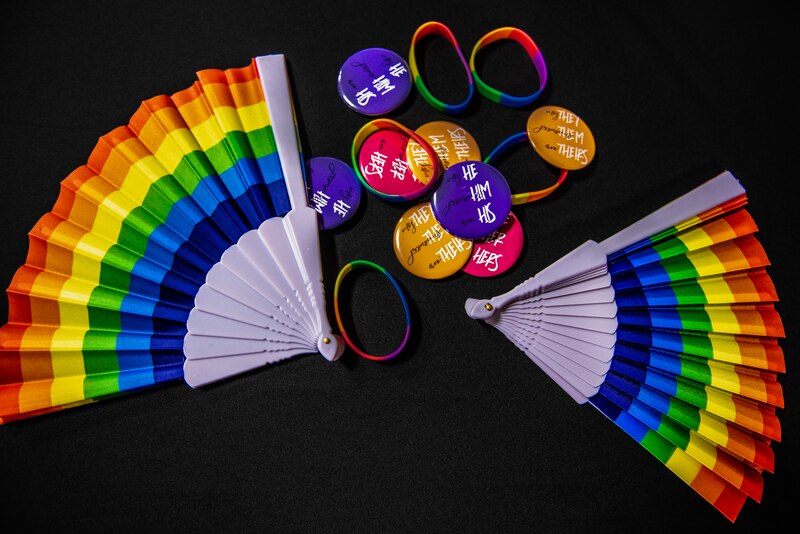
But just as TKO was creating a safe haven for gender diversity, politicians were trying to outlaw medical care that can be lifesaving for some trans teens.
In February, Republican state lawmakers introduced a bill that would send doctors and nurses to prison for up to 10 years if they prescribed hormones or puberty-blocking medication to transgender young people. The lawmakers called the treatments risky and experimental, but major medical associations support access to such care and say the treatments are safe, backed by evidence, and associated with lower rates of suicidality and depression for the young people who receive them.
TKO’s leaders spoke out against the proposal at legislative hearings and brought the Youth Ambassadors to meetings with lawmakers. But anti-LGBTQ laws continued to gain traction nationally and, in April, Alabama’s legislature passed the ban on gender-affirming care, along with other bills aimed at LGBTQ youth. Gov. Kay Ivey signed it into law, explaining: “I believe very strongly that if the Good Lord made you a boy, you are a boy, and if he made you a girl, you are a girl.”
“Our existence just bothers them,” Peyton says to the group. “So it’s just like, we’ve got to keep fighting for us.”
Joyful resistance

What does it mean to fight back?
Sometimes it is marching in the streets, fists raised in defiance, Baker says to the group. “But activism is expansive,” he adds. It also can be storytelling, friendship, or checking in on your community.
“Everybody on this call is an activist in their own right,” he says.
After Alabama’s anti-trans restrictions became law, many in the LGBTQ community were devastated. But, for trans people of color in particular, giving up is a luxury that most can’t afford. As TC Caldwell, TKO’s community engagement director, put it: “Our work doesn’t stop or start with a bill.”
Instead, in its own way, the group continued to fight back.
The month after the bill passed, TKO held a gathering in Montgomery’s Shakespeare Park. It was not a strategy session or protest, but a celebration of community. Laughing children raced across the grass, teenagers played cards, and DaQuon, draped in a rainbow flag, blew bubbles.
“Black joy is so revolutionary,” Caldwell said. “The audacity to celebrate when people are telling you there’s nothing to celebrate.”
In June, TKO staffers traveled to Pride events across the state, offering free HIV testing and information about their services. At Selma’s event, the Youth Ambassadors hosted an open mic night where DaQuon performed an Erykah Badu song and Zuriel read a piece about her transition.
Zuriel also has continued to create videos celebrating trans beauty and pride, which she posts to her nearly 14,000 followers on TikTok.
“Today for example, I got up, did my makeup, and I started making videos,” she says when Baker asks the group what their activism looks like. “Little things like that actually matter.”
Zuriel and DaQuon also joined the TKO staff as paid peer navigators, helping other Black queer teens get the services they need. Taking care of your people is another way to fight oppression, DaQuon tells the group. So is living authentically.
“Being unapologetic about who I am,” they say, “that’s activism as well.”
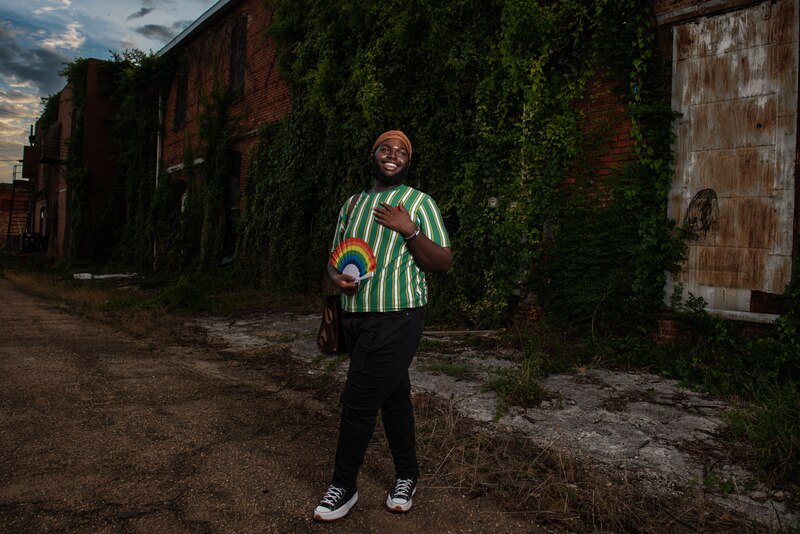
As the meeting winds down, Baker gives a few updates. He is arranging for some Black queer elders and artists to speak with the group. He’s also looking into funding for a “healing extravaganza,” a festival of sorts that DaQuon proposed. Peyton suggested incorporating water, a symbol of cleansing and rebirth.
The event resembles the future that Baker envisions, “where queer youth can have soft lives, where they can have tender lives.”
Before the group members say their goodbyes and log off this July afternoon, they recite an affirmation. Baker came up with it in college, and now his babies have made it their own.
“I have a voice,” each young person says. “It is powerful. I am powerful.”
Patrick Wall is a senior reporter covering national education issues. Contact him at pwall@chalkbeat.org.


